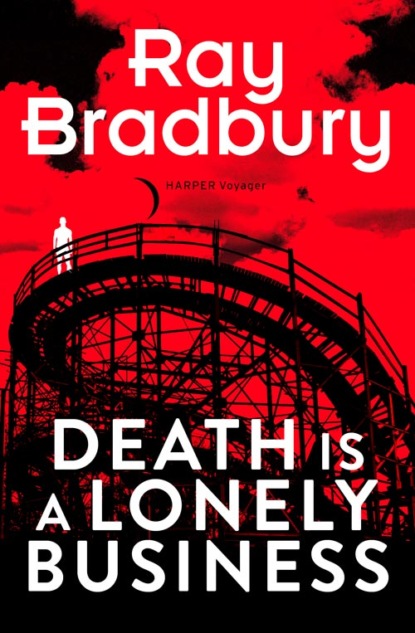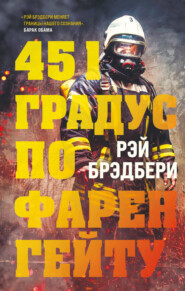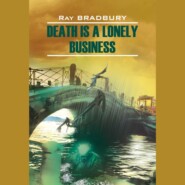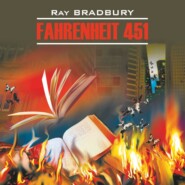По всем вопросам обращайтесь на: info@litportal.ru
(©) 2003-2024.
✖
Death is a Lonely Business
Настройки чтения
Размер шрифта
Высота строк
Поля
A long silence.
The whole tenement leaned again, the other way, like the earth turning in its noon slumbers.
The strains of the first act of Tosca moved up around Mrs. Gutierrez. She spoke.
“Fannie says—”
“I hear the music, Mrs. Gutierrez. That means “Yes’!”
I hung up. At the same instant, a hundred thousand tons of salt water fell on the shore, a few yards away, with exquisite timing. I nodded at God’s precision.
Making sure I had twenty cents in my pocket, I ran for the next train.
She was immense.
Her real name was Cora Smith, but she called herself Fannie Florianna, and no one ever called her otherwise. And I had known her, years ago, when I lived in the tenement, and stayed in touch with her after I moved out to the sea.
Fannie was so huge that she never slept lying down. Day and night she sat in a large-sized captain’s chair fixed to the deck of her tenement apartment, with bruise marks and dents in the linoleum which her great weight had riveted there. She moved as little as possible, her breath churning in her lungs and throat as she sailed toward the door, and squeezed out to cross the hall to the narrow water-closet confines where she feared she might be ignominiously trapped one day. “My God,” she often said, “wouldn’t it be awful if we had to get the fire department to pry me out of there.” And then back to her chair and her radio and her phonograph and, only a beckon away, a refrigerator filled with ice cream and butter and mayonnaise and all the wrong foods in the wrong amounts. She was always eating and always listening. Next to the refrigerator were bookshelves with no books, only thousands of recordings of Caruso and Galli-Curci and Swarthout and the rest. When the last songs were sung and the last record hissed to a stop at midnight, Fannie sank into herself, like an elephant shot with darkness. Her great bones settled in her vast flesh. Her round face was a moon watching over the vast territorial imperatives of her body. Propped up with pillows, her breath escaped and sucked back, escaped again, fearful of the avalanche that might happen if somehow she lay back too far, and her weight smothered her, her flesh engulfed and crushed her lungs, and put out her voice and light forever. She never spoke of it, but once when someone asked why there was no bed in her room, her eyes burned with a fearful light, and beds were never mentioned again. Fat, as Murderer, was always with her. She slept in her mountain, afraid, and woke in the morning glad for one more night gone, having made it through.
A piano box waited in the alley below the tenement.
“Mine,” said Fannie. “The day I die, bring the piano box up, tuck me in, hoist me down. Mine. Oh, and while you’re at it, there’s a dear soul, hand me that mayonnaise jar and that big spoon.”
I stood at the front door of the tenement, listening.
Her voice flowed down through the halls. It started out as pure as a stream of fresh mountain water and cascaded through the second to the first and then along the hall. I could almost drink her singing, it was that clear.
Fannie.
As I climbed up the first-floor steps she trilled a few lines from La Traviata. As I moved on the second flight, pausing, eyes shut, to listen, Madame Butterfly sang welcome to the bright ship in the harbor and the lieutenant in his whites.
It was the voice of a slender Japanese maiden on a hill on a spring afternoon. There was a picture of that maid, aged seventeen, on a table near the window leading out onto the second-floor tenement porch. The girl weighed 120 pounds at most, but that was a long time ago. It was their voice that pulled me up through the old stairwell—a promise of brightness to come.
I knew that when I got to the door, the singing would stop.
“Fannie,” I’d say. “I heard someone singing up here just now.”
“Did you?”
“Something from Butterfly.”
“How strange. I wonder who it could have been?”
We had played that game for years, talked music, discussed symphony/ballet/opera, listened to it on radios, played it on her old Edison crank-up phono, but never, never once in three thousand days, had Fannie ever sung when I was in the room with her.
But today was different.
As I reached the second floor her singing stopped. But she must have been thinking, planning. Maybe she had glanced out and seen the way I walked along the street. Maybe she read my skeleton through my flesh. Maybe my voice, calling far across town on the phone (impossible) had brought the sadness of the night and the rain with it. Anyway, a mighty intuition heaved itself aware in Fannie Florianna’s summer bulk. She was ready with surprises.
I stood at her door, listening.
Creaks as of an immense ship blundering through tides. A great conscience stirred there.
A soft hissing: the phonograph!
I tapped on the door.
“Fannie;” I called. “The Crazy is here.”
“Voilà!”
She opened the door to a thunderclap of music. Great lady, she had put the shaved wooden needle on the hissing record, then surged to the door, held the knob, waiting. At the whisk of the baton down, she had flung the door wide. Puccini flooded out, gathered round, pulled me in. Fannie Florianna helped.
It was the first side of Tosca. Fannie planted me in a rickety chair, lifted my empty paw, put a glass of good wine in it. “I don’t drink, Fannie.”
“Nonsense. Look at your face. Drink!” She surged around like those wondrous hippos turned light as milkweed in Fantasia, and sank like a terribly strange bed upon her helpless chair.
By the end of the record I was crying.
“There, there,” whispered Fannie, refilling my glass. “There, there.”
“I always cry at Puccini, Fannie.”
“Yes, dear man, but not so hard.”
“Not so hard, true.” I drank half of the second glass. It was a 1938 St. Emilion from a good vineyard, brought and left by one of Fannie’s rich friends who came clear across town for good talk, long laughs, better times for both, no matter whose income was higher. I had seen some of Toscanini’s relatives going up the stairs one night, and waited. I had seen Lawrence Tibbett coming down, once, and we had nodded, passing. They always brought the best bottles with their talk, and they always left smiling. The center of the world can be anywhere. Here it was on the second floor of a tenement on the wrong side of L.A.
I wiped tears on my jacket cuff.
“Tell me,” said the great fat lady.
“I found a dead man, Fannie. And no one will listen to me about it!”
“My God.” Her round face got rounder as her mouth opened, her eyes went wide, then softened to commiseration. “Poor boy. Who?”
“It was one of those nice old men who sit in the ticket office down at the Venice Short Line stop, been sitting there since Billy Sunday thumped the Bible and William Jennings Bryan made his Cross of Gold speech. I’ve seen them there since I was a kid. Four old men. You felt they’d be there forever, glued to the wooden benches. I don’t think I ever saw one of them up and around. They were there all day, all week, all year, smoking pipes or cigars, and talking politics thirteen to the dozen and deciding what to do with the country. When I was fifteen one of them looked at me and said, ‘You going to grow up and change the world only for the best, boy?’ ‘Yes, sir!’ I said. ‘I think you’ll do it,’ he said. ‘Won’t he, gents?’ ‘Yes,’ they all said, and smiled at me. The old man who asked me that, he’s the one I found in the lion cage last night.”
“In the cage?”
“Under water, in the canal.”
“This calls for one more side of Tosca.”
Fannie was an avalanche getting up, a tide flowing to the machine, a mighty force cranking the windup arm, and God’s whisper putting the needle down on a new surface.
As the music rose, she came back into her chair like a ghost ship, regal and pale, quiet and concerned.
“I know one reason why you’re taking this so hard,” she said. “Peg. She still in Mexico, studying?”

















